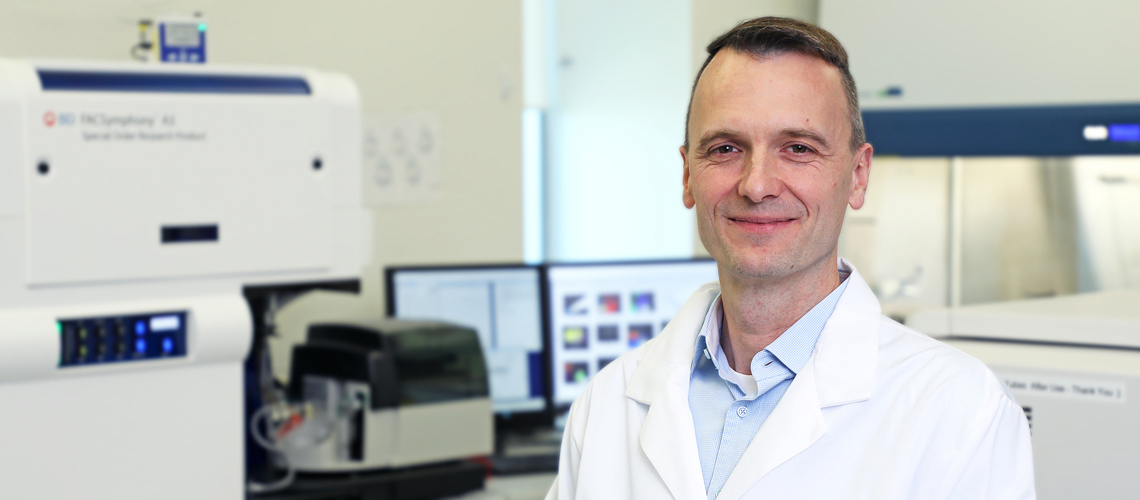Gengenbacher Lab
Dr. Gengenbacher received his Ph.D. from the University of Heidelberg in Germany and completed his postdoctoral training at the Novartis Institute for Tropical Diseases in Singapore. He extended experience at high-profile institutions including the Max Planck Institute for Infection Biology in Berlin and the National University of Singapore prior moving to the United States. For more than 17 years Dr. Gengenbacher’s research focused on the optimization of existing therapies and the discovery of novel approaches to address the global crisis associated with the human pathogen Mycobacterium tuberculosis, the etiological agent of tuberculosis (TB). He has developed several new vaccine candidates with superior efficacy and improved safety over Bacille Calmette-Guérin (BCG), the only licensed TB vaccine. He contributed to the preclinical development of VPM1002, a BCG replacement vaccine currently in phase III clinical trials. Dr. Gengenbacher has also contributed to the discovery and preclinical characterization of novel drugs against M. tuberculosis and the emerging pathogen M. abscessus, that can cause a TB-like difficult-to-treat lung disease.
Read our interview with Dr. Gengenbacher.
Selected Publications
- Vitamin B6 biosynthesis is essential for survival and virulence of Mycobacterium tuberculosis. Dick T, Manjunatha U, Kappes B, Gengenbacher M. Mol Microbiol. 2010 Nov;78(4):980-8.
- Reduced drug uptake in phenotypically resistant nutrient-starved nonreplicating Mycobacterium tuberculosis. Sarathy J, Dartois V, Dick T, Gengenbacher M. Antimicrob Agents Chemother. 2013 Apr;57(4):1648-53.
- Comprehensive insights into transcriptional adaptation of intracellular mycobacteria by microbe-enriched dual RNA sequencing. Rienksma RA, Suarez-Diez M, Mollenkopf HJ, Dolganov GM, Dorhoi A, Schoolnik GK, Martins Dos Santos VA, Kaufmann SH, Schaap PJ, Gengenbacher M. BMC Genomics. 2015 Feb 5;16:34.
- Deletion of nuoG from the vaccine candidate BCG ΔureC::hly improves protection against tuberculosis. Gengenbacher M., Nieuwenhuizen N, Vogelzang A, Liu H, Kaiser P, Schuerer S, Lazar D, Wagner I, Mollenkopf HJ, Kaufmann SH. mBio. 2016 May 24;7(3):e00679-16.
- NOS2-deficient mice with hypoxic necrotizing lung lesions predict outcomes of tuberculosis chemotherapy in humans. Gengenbacher M., Duque-Correa MA, Kaiser P, Schuerer S, Lazar D, Zedler U, Reece ST, Nayyar A, Cole ST, Makarov V, Barry Iii CE, Dartois V, Kaufmann SHE. Sci Rep. 2017 Aug 18;7(1):8853.
- Novel acetamide indirectly targets mycobacterial transporter MmpL3 by proton motive force disruption. Shetty A, Xu Z, Lakshmanan U, Hill J, Choong ML, Chng SS, Yamada Y, Poulsen A, Dick T, Gengenbacher M. Front Microbiol. 2018 Dec 4;9:2960.
- Rifabutin Is Active against Mycobacterium abscessus in Mice. Dick T, Shin SJ, Koh WJ, Dartois V, Gengenbacher M. Antimicrob Agents Chemother. 2020 Jan 27;64(2):e01943-19.
Book Chapters
- Mycobacterium tuberculosis in the proteomics era. Gengenbacher M, Mouritsen J, Schubert OT, Aebersold R, Kaufmann SH. Molecular Genetics of Mycobacteria, 2nd edition. Edited by Hartful G, Jacobs WR. American Society for Microbiology, 2013.

